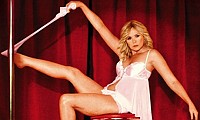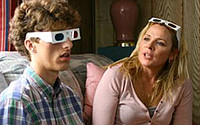 A terrific dive
A terrific diveKim Cattrall introduces us to Monica Velour...


At the premiere with writer-director Keith Bearden (above), and as
Monica with Dustin Ingram (below)

KIM CATTRALL
21.Aug.56 • Liverpool







 After watching her in Meet Monica Velour, you can't help but expect Kim Cattrall to walk into the room looking all of her 54 years. Guess again. She is every bit the slim, glamorous movie star, gliding into her chair and maintaining her charm right through the interview. She's a pro at delivering a punchline, maintaining interested eye-contact and punctuating her conversation with telling personal details. Although sometimes "pro" seems to be the operative word, she is still a genuinely likeable person who's nothing at all like Samantha from Sex and the City.
After watching her in Meet Monica Velour, you can't help but expect Kim Cattrall to walk into the room looking all of her 54 years. Guess again. She is every bit the slim, glamorous movie star, gliding into her chair and maintaining her charm right through the interview. She's a pro at delivering a punchline, maintaining interested eye-contact and punctuating her conversation with telling personal details. Although sometimes "pro" seems to be the operative word, she is still a genuinely likeable person who's nothing at all like Samantha from Sex and the City.
Clearly this film is an effort to put some distance between you and Samantha.
Initially, when the series ended, I was tired and exhausted and I really wanted to go home, which me has been two places: Canada and England. Sir Peter Hall asked me to do a play in the West End, so I thought I'd go back to what I know, which is the theatre. I'd go back home where I have family and support. And just get away from what had been my life for the past eight years.
And I'm so glad I did it, because it gave me a tremendous amount of support, courage and objectivity of how I wanted the rest of my life to be — the kind of actress that I wanted to be and where the next block of 20-30 years in my career could go. And the feeling was, "If not now, when?" Fortunately, it has been a terrific dive.
But this role in particular means a tremendous amount, simply because to play a character different than myself but also to re-invent that character — physically, emotionally — and have the role to do it. When I read the script my agent said, "You're not gonna want to do this because it's about sex again." And I said, "Well, I don't think it's really about sex." I think this is a feminist film, which is also a comedy about a woman fighting for the custody of her daughter. Sex is the least that this is about. This is about sexualisation and marginalisation, but it's not about sex. And that really got me going. It also terrified me much more than any of the other roles that I've taken on, because I wasn't going to look sexy and pretty.

That 20 pounds
extra was heaven.
I loved eating and putting it on.
Oh, it was fantastic. It really was. I have a huge appetite and my body type is heavier than I am right now, so to be that 20 pounds extra was heaven. I loved eating and putting it on. I just savoured every bit of it, with wonderful meals and crap meals and McDonald's and chips and just whatever I wanted. It was not just the deprivation of having to play these two-dimensional characters on film in particular for most of my career, because when I was younger the choices that I made, whether it was Porky's, Police Academy, Big Trouble in Little China — those were all supplementing my theatre career whether I was in Los Angeles, New York, Toronto, wherever I was, because I didn't come from any kind of financial stability, so my work in television and film was supporting my theatre habit.
I was glad to do it and never really took it that seriously and thought, "Well yes I'm being sexualised, but that's OK. I'm making a living out of it and that was fine. These films are fun and I'm learning a little bit in front of the camera." But now I thought, "This is the time, this is the time to say 'yes' to things that scare you." Which is something that Jack Lemon had said to me very early on in my career when I did a film called Tribute. I asked him, "How do you have longevity in this business?" And he said, "You take risks."
How did playing Monica affect you?
I certainly had a couple of drinks after work, and I would never do that normally. I don't even like to drink that much, but I needed to come down from it, you know? But I didn't feel, "Here comes that big emotional scene I have to do." It was just another day with Monica. And that whole thing with the biker — kissing the biker when he leaves — that's not written. And that's a real biker! I thought, "How did I do that?"
The thing I love about this is that it unfolds in such a subtle way and you get to know this character. There's no heart of gold, she's not completely likeable, which is very unusual for an American film: to have a female anti-hero — it's basically unheard-of — and to get away with it, to make it work. And for women, this whole marginalisation thing — which I'm fighting and most of us are fighting as we get older, whatever profession we're in — also comes to play. That engaged me in another way.
What about the strip club scene?
It was the last scene we shot, and I'm really glad because it was the heaviest that I was. I gained 15 pounds before we started and another 5 or 6 in the course of shooting. And I made a very clear choice that she wasn't in her body, which protected me for quite a while through the many different angles that we had to do. But after a while it did seep through and it did affect me, and also being the last night — we shot until 5 in the morning, and even though those kids [in the audience] were acting, I'm not made of stone and it does have an effect on you. There was a bitter taste of reality there: I went into my dressing room at the end of it and had a good cry. I think a lot of it was just coming down from the high of what we were doing. But hearing that age rage — because it's everywhere, especially on the internet if you Google someone over 50 — the things that people say are pretty horrific. But that's what the film is about, and that's why it's a brave film. I think it's also a feminist film as well. And I can't believe that a man made it!

I don’t see strippers as far off from some young women who come to Hollywood to be actresses.
Well, I have empathy for them. I don't see them as far off from some young women who come to Hollywood to be actresses. They have a dream, maybe it's to be a model, and they show up at an open call and someone says, "Well, it's this kind of modelling." And they've got to pay their rent, so they do it once, then twice and suddenly they're getting known for it. If you've seen Boogie Nights, I don't see those women as being victimised. They create a family within the industry they have, and some women have come out and created their own industry.
But this character is a victim of it, and she has no education and she has no choices. To be a porn star you're outside of society. At the premiere of Meet Monica Velour, a couple of porn stars were there, and my publicist was a little nervous about it. And I was like, "They're here because they're part of something I played. You've got to relax a bit about this." And these are sophisticated people; you take that to rural America and she's like a pariah, she can't get a six-buck-an-hour shampoo job in any town because she's labelled out-of-date, abused, used, done. It's tragic isn't it?
Do you feel lucky by comparison?
Oh my God, yes! I have choices, a voice, a platform. I can't compare myself to her situation in any way. But I think the similarity is the survival. There's so many times in my career when I could have said, "This is really too hard and I don't want to do it." It's a really hard, f**king lonely job in a lot of ways — the highs and lows, you work, you don't work, are you going to be able to pay your rent, are you good enough, are you not good enough, are you pretty enough, are you smart enough, are you all these things enough? I mean, we go through it as human beings every day, but when you're in the public eye and you're sort of a known entity, you're supposed to be beyond that and have it together. And sometimes you're just a person in a hotel room who can't go out.
Do you think the industry has changed for women?
It's gotten better: a part for a woman in her 50s like this exists. Mamma Mia existed, Sex and the City exists. It's better. It's job by job. Me saying "yes" to this meant it got made, and if I can continue to do that as long as possible, that would be great. I mean, having heat in Hollywood, someone once said to me, is like having a little fire in Alaska on a snowy night. You don't know how long it's going to last, so you just fan the flames.
SOHO HOTEL, LONDON • 23.JUN.11
HOME | REVIEWS | AWARDS | NEWS | FESTIVAL | Q&A | ABOUT | TALKBACK